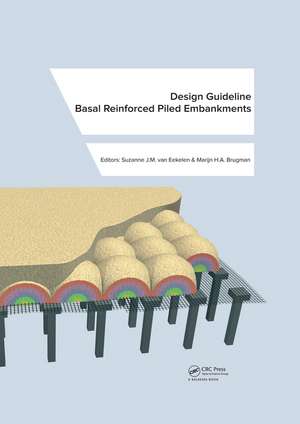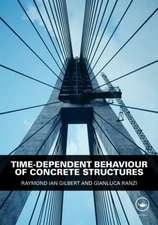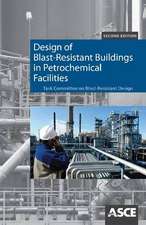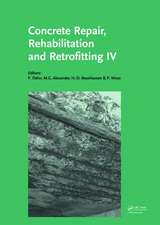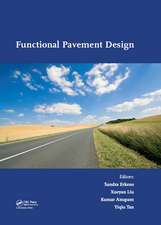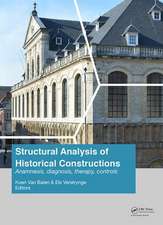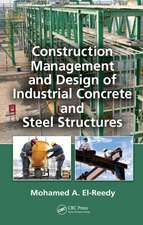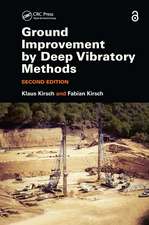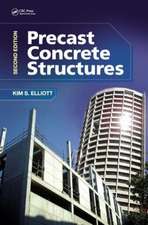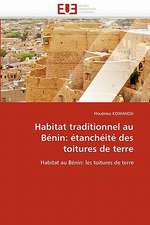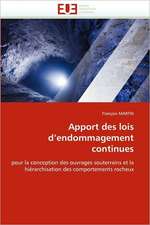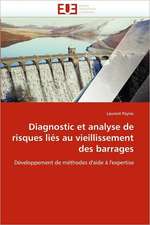Design Guideline Basal Reinforced Piled Embankments
Editat de Suzanne J.M. Eekelen, Marijn H.A. Brugmanen Limba Engleză Hardback – 4 iul 2016
A basal reinforced piled embankment can be used for the construction of a road or a railway when a traditional construction method would require too much construction time, affect vulnerable objects nearby or give too much residual settlement, making frequent maintenance necessary.
This publication is a guideline (CUR226) for the design of basal reinforced piled embankments. The guideline covers the following subjects: a survey of the requirements and the basic principles for the structure as a whole; some instructions for the pile foundation and the pile caps; design rules for the embankment with the basal geosynthetic reinforcement; extensive calculation examples; finite element calculations; construction details and management and maintenance of the piled embankment. The guideline includes many practical tips. The design guideline is based on state-of-the-art Dutch research, which was conducted in cooperation with many researchers from different countries.
Preț: 680.66 lei
Preț vechi: 914.35 lei
-26% Nou
Puncte Express: 1021
Preț estimativ în valută:
130.26€ • 141.44$ • 109.42£
130.26€ • 141.44$ • 109.42£
Carte tipărită la comandă
Livrare economică 22 aprilie-06 mai
Preluare comenzi: 021 569.72.76
Specificații
ISBN-13: 9789053676240
ISBN-10: 9053676244
Pagini: 156
Dimensiuni: 170 x 245 mm
Greutate: 0.45 kg
Ediția:1
Editura: CRC Press
Colecția CRC Press
ISBN-10: 9053676244
Pagini: 156
Dimensiuni: 170 x 245 mm
Greutate: 0.45 kg
Ediția:1
Editura: CRC Press
Colecția CRC Press
Public țintă
Postgraduate, Professional, and Professional Practice & DevelopmentCuprins
Preface
Nomenclature
1 Introduction
2 Requirements and initial details of reinforced embankments
3 Requirements and initial details for the piles and pile caps
4 Design of the reinforced embankment
5 Calculation examples for the design of reinforced embankments
6 Numerical modelling
7 Transition zones
8 Construction details
9 Management and maintenance
Appendix A Traffic load tables
Nomenclature
1 Introduction
2 Requirements and initial details of reinforced embankments
3 Requirements and initial details for the piles and pile caps
4 Design of the reinforced embankment
5 Calculation examples for the design of reinforced embankments
6 Numerical modelling
7 Transition zones
8 Construction details
9 Management and maintenance
Appendix A Traffic load tables
Notă biografică
Dr. Suzanne J.M. van Eekelen is a researcher in geotechnical engineering and an expert in the field of geosynthetic reinforcement, in particular piled embankments.She has reviewed or advised many piled embankment projects and she specialises in laboratory experiments and field monitoring. She is chairing the Dutch SBRCURnet committees ‘Design Guideline Basal Reinforced Piled Embankments’ and ‘Retaining Walls of Reinforced Soil’ and works for Deltares, a knowledge institute for applied research in the field of water and subsurface. With her co-workers, Suzanne van Eekelen has developed an analytical model for the design of the basal reinforcement in piled embankments. This model was adopted in this guideline for basal reinforced piled embankments. Dr. Suzanne van Eekelen received the IGS Award of the International Geosynthetics Society for her research on basal reinforced piled embankments in 2014, the Award for the best paper in Geotextiles and Geomembranes in 2012, two Honourable Mentions for her papers in Geotextiles and Geomembranes in 2011 and 2015 and the Dutch/Belgium Keverling Buisman-Science award 2011.
Marijn H.A. Brugman, MSc, is a geotechnical and geological design engineer and an expert in geosynthetic applications and underground construction. He works for the Dutch engineering and consulting company Arthe Civil & Structure. Marijn Brugman has served as a consultant in many building-, construction- and infrastructural projects around the world and has designed various piled embankments. He is a member of several committees for geotechnical design guidelines in the Netherlands and has served as editor and secretary of the SBRCURnet committee ‘Design Guideline Basal Reinforced Piled Embankments’.
SBRCURnet is an independent knowledge network for the entire Dutch building industry. The knowledge and tools that SBRCURnet develops and provides, help corporate professionals and governments improve their skillsets and their business in both civil engineering and house building. SBRCURnet initiates and coordinates joint research projects with both public bodies and private companies. By initiating, organizing and publishing about these innovative solutions, SBRCURnet stimulates the further development of the entire industry. We do this because we believe that innovation is best stimulated by sharing knowledge and working together. Our focus is to link organizations in developing new knowledge on current issues. It issues approximately 500 publications about best practices and innovative building issues. Most of our research projects and activities result in the publication of guidance documents, many of which have been adopted as the standard for excellence in their respective areas.
Although generally published in Dutch, some of our best publications (handbooks) are also published in English, for an international public.
Marijn H.A. Brugman, MSc, is a geotechnical and geological design engineer and an expert in geosynthetic applications and underground construction. He works for the Dutch engineering and consulting company Arthe Civil & Structure. Marijn Brugman has served as a consultant in many building-, construction- and infrastructural projects around the world and has designed various piled embankments. He is a member of several committees for geotechnical design guidelines in the Netherlands and has served as editor and secretary of the SBRCURnet committee ‘Design Guideline Basal Reinforced Piled Embankments’.
SBRCURnet is an independent knowledge network for the entire Dutch building industry. The knowledge and tools that SBRCURnet develops and provides, help corporate professionals and governments improve their skillsets and their business in both civil engineering and house building. SBRCURnet initiates and coordinates joint research projects with both public bodies and private companies. By initiating, organizing and publishing about these innovative solutions, SBRCURnet stimulates the further development of the entire industry. We do this because we believe that innovation is best stimulated by sharing knowledge and working together. Our focus is to link organizations in developing new knowledge on current issues. It issues approximately 500 publications about best practices and innovative building issues. Most of our research projects and activities result in the publication of guidance documents, many of which have been adopted as the standard for excellence in their respective areas.
Although generally published in Dutch, some of our best publications (handbooks) are also published in English, for an international public.
Recenzii
"The design guidelines in this book are comprehensive and present a step-by-step approach to the design of these systems that is in conformity with the European Eurocode. [...] An important feature of the book are extensive calculation examples. The book also includes guidance on numerical modelling of these systems for more complex scenarios. This is a lovely book full of high-quality pictures, comprehensive calculation examples and many practical tips. The book represents the state-of-the-art for geosynthetic-reinforced pile-supported embankment design that is founded on extensive Dutch research. It is a must-have for both practitioners and researchers."
Professor Richard J. Bathurst, Professor of Civil Engineering at the Royal Military College of Canada, Geosynthetics International 24:1 (2017).
Professor Richard J. Bathurst, Professor of Civil Engineering at the Royal Military College of Canada, Geosynthetics International 24:1 (2017).
Descriere
A basal reinforced piled embankment can be used for the construction of a road or a railway when a traditional construction method would require too much construction time. This publication provides a guideline for the design of basal reinforced piled embankments, including many practical directions for the design. The guideline consists of the following items: a survey of the requirements and the basic principles for the structure as a whole, some instruction for the pile foundation and the pile caps, design rules for the embankment with the basal geosynthetic reinforcement, calculation examples, finite element calculations and the realization and the maintenance of the piled embankment.
